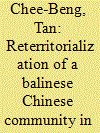| Srl | Item |
| 1 |
ID:
184147


|
|
|
|
|
| Summary/Abstract |
This article explores how local Chinese authorities employed various strategies to promote the Patriarch of Sanping’s cult in post-Mao China from 1979 to 2015. It argues that the cult of the Patriarch of Sanping became an invented tradition for expanded religious tourism in Pinghe County in Zhangzhou, Fujian Province. Local state agents employed various placemaking strategies to promote Sanping Monastery and endorse the deity’s efficacy, creating an opportunity for resources to be channeled from other parts of China, Taiwan, and overseas Chinese communities to develop Pinghe County. This study shows that, on the one hand, local state agents have propagated miracle tales to entice devotees to visit and make donations to this monastery while, on the other hand, they have courted scholars, journalists, and tour guides to generate attention and interest in the cult. Overall, this article demonstrates how local government placemaking and marketing strategies have contributed to the transformation of a Buddhist master from a local deity to a popular god in contemporary China.
|
|
|
|
|
|
|
|
|
|
|
|
|
|
|
|
| 2 |
ID:
095244


|
|
|
|
|
| Publication |
2010.
|
| Summary/Abstract |
This paper is about a special category of guiqiao or 'returned overseas Chinese', in southern Fujian. Arriving in China from Bali, Indonesia in 1961, the people were settled in an overseas Chinese farm. The paper illustrates how the re-migrants coped with life in China and how they see themselves today. The returned overseas Chinese reterritorize their Indonesian and Balinese cultural life in China, and they, including the local-born children, speak Balinese and eat Indonesian food. Their experiences provide much food for thought on acculturation, migration and identity as well as on the idea of 'homeland'
|
|
|
|
|
|
|
|
|
|
|
|
|
|
|
|
| 3 |
ID:
073441


|
|
|
|
|
| Publication |
2006.
|
| Summary/Abstract |
This article offers an exploration of what it means to be "emplaced" amidst the various spatial and temporal streams currently flowing through an emigrant village in the Fuzhou countryside along the southeast coast of China. These flows include both transnational currents resulting from two decades of mass emigration via human smuggling networks to the United States and other foreign destinations as well as national and translocal currents driven in part by Post-Mao reforms for market liberalization and China's "opening up" (kaifang). Particularly, I aim to provide a corrective to the overemphasis of displacement as an experience outside of "home" and moreover, to the mystification of "home" sites as imaginary places simply of longing and belonging. My goal is not to dismiss symbolic understandings of mythical homelands but rather to better contextualize and refine assumptions of migrant displacement in relation to imaginations of locality and belonging from the empirical and phenomenological grounds of those who remained behind. Significantly, approaching issues of migrant identities and social formations from the location of dispersion rather than arrival enabled me to critically examine and situate existing analytic assumptions of displacement (e.g., as migrant nostalgia for "home") alongside local theorizations of emplacement made by those who stayed put as others moved around them. As I will show for my Fuzhounese subjects, the ultimate form of displacement was seen and experienced as the result of immobility, rather than physical departure from a "home."
|
|
|
|
|
|
|
|
|
|
|
|
|
|
|
|